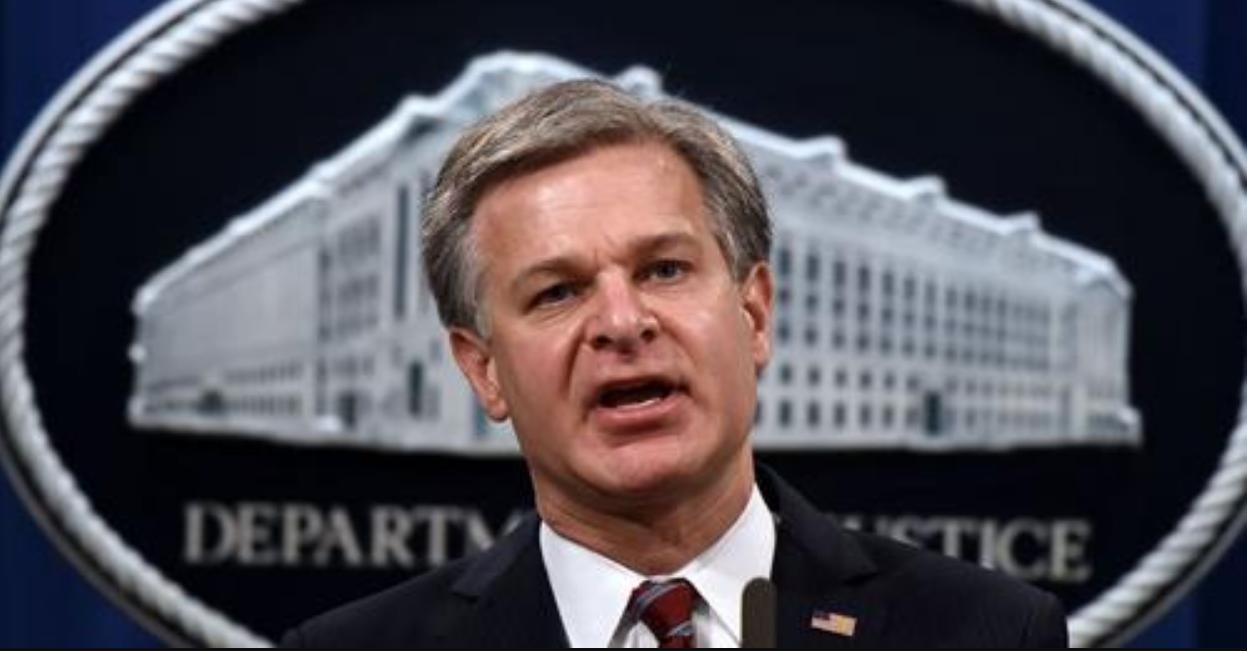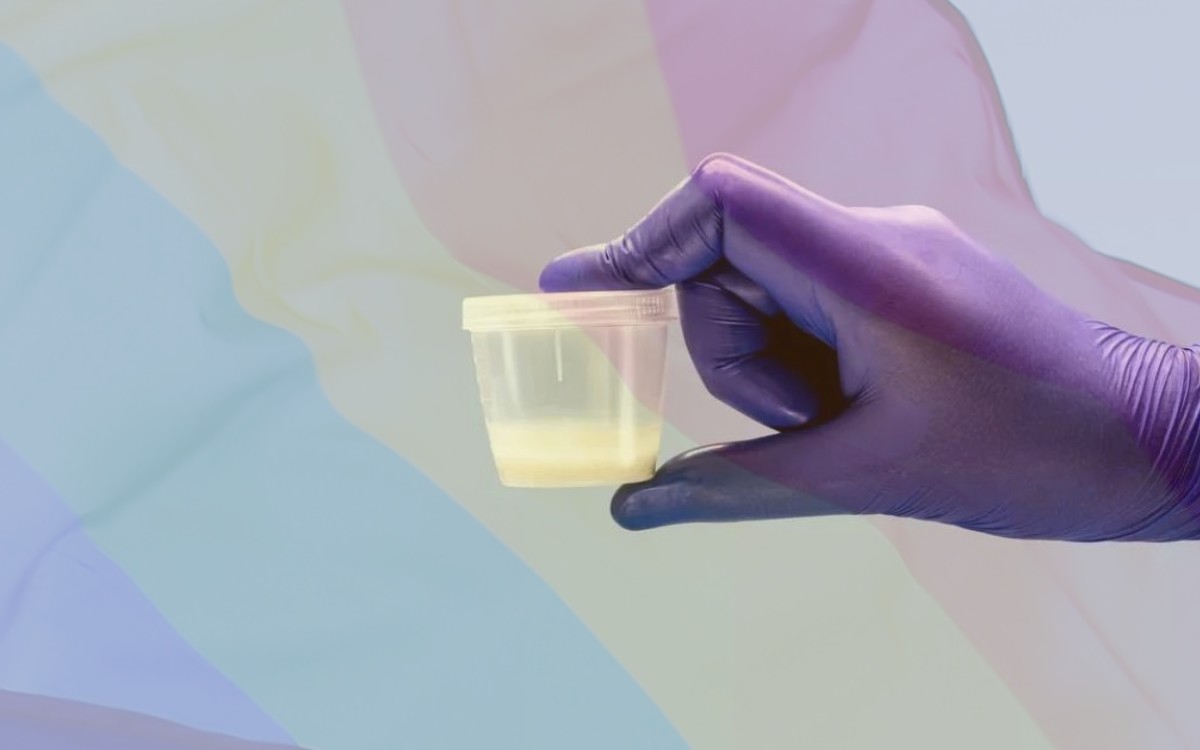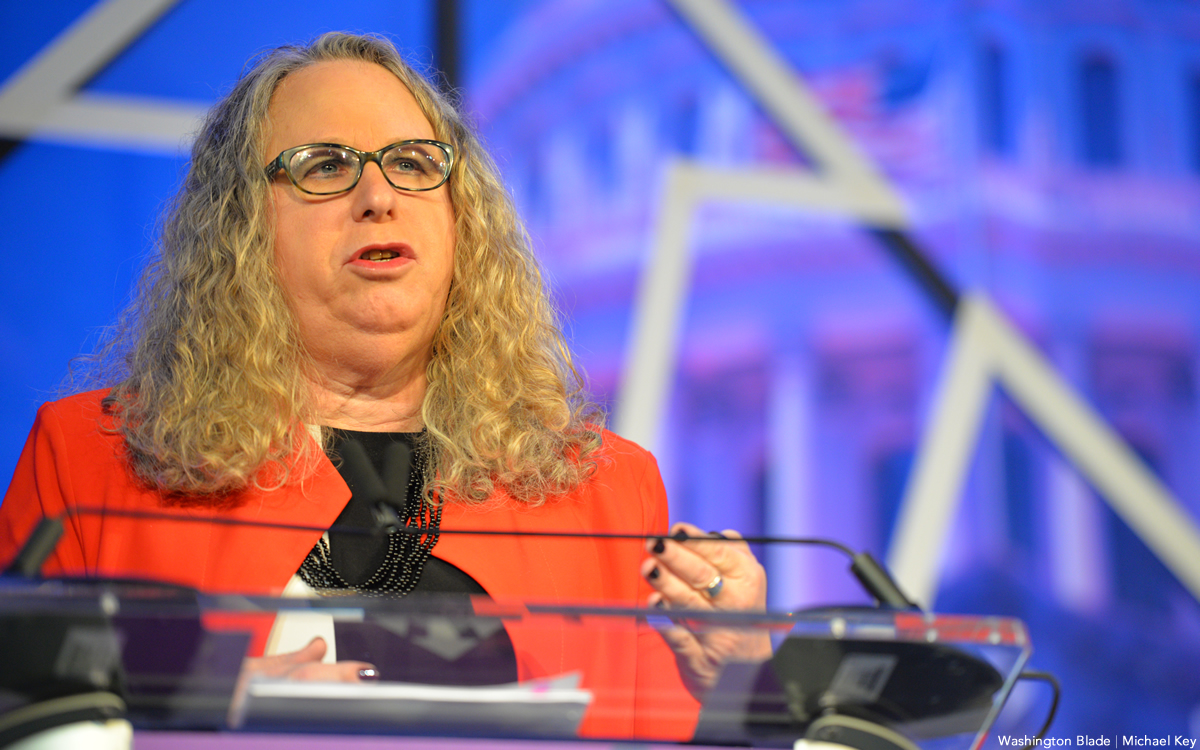Federal Government
Sharp increase in anti-LGBTQ hate crimes, FBI finds
Murders, non-negligent manslaughters are down

Compared to 2021 estimates, hate crimes last year that were motivated by bias against the victims’ sexual orientation rose 13.8 percent while those motivated by bias against the victims’ gender identity rose 32.9 percent, according to data from the FBI.
The agency’s numbers come from the Uniform Crime Reporting Program, largely through the National Incident-Based Reporting System and the Summary Reporting System, which the FBI says collectively accounts for 93.5 percent of the U.S. population.
Data shows the increases in anti-LGBTQ hate crimes came despite a decrease, by 6.1 percent, of estimated murder and non-negligent manslaughter cases during this same period.
“The rise in hate crimes against the LGBTQ+ community is both shocking and heartbreaking, yet sadly, not unexpected,” Human Rights Campaign President Kelley Robinson said in a statement responding to the FBI’s report.
“The constant stream of hostile rhetoric from fringe anti-equality figures, alongside the relentless passage of discriminatory bills, particularly those targeting transgender individuals, in state legislatures, created an environment where it was sadly foreseeable that individuals with violent tendencies might respond to this rhetoric,” she said.
“The FBI’s data serves as another alarming indicator of the state of emergency our community finds itself in,” Robinson said, adding, “We also know that this data is incomplete, that too many cities and states are reporting incomplete data, or even no data at all, on hate crimes against the LGBTQ+ community. If we’re going to bring a stop to that violence, we need a full accounting of just how many hate crimes are taking place – and that requires every jurisdiction stepping up.”
HRC reports that more than 20 percent of reported hate crimes are are now motivated by anti-LGBTQ bias, amid a “horrifying wave” of fatal violence against, particularly, Black transgender women.
The group in June declared a state of emergency for LGBTQ people in the U.S., citing, among other factors, the “wave of harmful and discriminatory legislation — some of which was engineered and championed by extremist GOP candidates running for president and their allies — and the concurrent spike in anti-transgender rhetoric and violence.”
Federal Government
Lambda Legal praises Biden-Harris administration’s finalized Title IX regulations
New rules to take effect Aug. 1

The Biden-Harris administration’s revised Title IX policy “protects LGBTQ+ students from discrimination and other abuse,” Lambda Legal said in a statement praising the U.S. Department of Education’s issuance of the final rule on Friday.
Slated to take effect on Aug. 1, the new regulations constitute an expansion of the 1972 Title IX civil rights law, which prohibits sex-based discrimination in education programs that receive federal funding.
Pursuant to the U.S. Supreme Court’s ruling in the landmark 2020 Bostock v. Clayton County case, the department’s revised policy clarifies that discrimination on the basis of sexual orientation and gender identity constitutes sex-based discrimination as defined under the law.
“These regulations make it crystal clear that everyone can access schools that are safe, welcoming and that respect their rights,” Education Secretary Miguel Cardona said during a call with reporters on Thursday.
While the new rule does not provide guidance on whether schools must allow transgender students to play on sports teams corresponding with their gender identity to comply with Title IX, the question is addressed in a separate rule proposed by the agency in April.
The administration’s new policy also reverses some Trump-era Title IX rules governing how schools must respond to reports of sexual harassment and sexual assault, which were widely seen as imbalanced in favor of the accused.
Jennifer Klein, the director of the White House Gender Policy Council, said during Thursday’s call that the department sought to strike a balance with respect to these issues, “reaffirming our longstanding commitment to fundamental fairness.”
“We applaud the Biden administration’s action to rescind the legally unsound, cruel, and dangerous sexual harassment and assault rule of the previous administration,” Lambda Legal Nonbinary and Transgender Rights Project Director Sasha Buchert said in the group’s statement on Friday.
“Today’s rule instead appropriately underscores that Title IX’s civil rights protections clearly cover LGBTQ+ students, as well as survivors and pregnant and parenting students across race and gender identity,” she said. “Schools must be places where students can learn and thrive free of harassment, discrimination, and other abuse.”
Federal Government
FDA plans to lift ban on gay, bisexual sperm donors
Ban has been in place since 2005

The Food and Drug Administration is planning to lift its ban on sperm donations from men who have sex with men, according to a report in the Wall Street Journal. The report also says the FDA would simultaneously lift the ban on donations of other tissues and organs from gay and bisexual men.
The Wall Street Journal report suggests that the FDA could put out a draft of the new policy for public comment by the summer, with a final rule in place by the end of 2024 or early 2025.
Reached for comment, a spokesperson for the FDA would not confirm the Wall Street Journal story, but acknowledged that, “the FDA routinely reviews approaches regarding donor screening and testing for donors of human cells, tissues and cellular and tissue-based products (HCT/Ps) to determine what changes, if any, are appropriate based on technological and evolving scientific knowledge.”
The FDA imposed the sperm donation ban on men who have sex with men in 2005, as part of an expansion on existing prohibitions on blood donations from gay and bisexual men which were meant to mitigate the risk that HIV could be spread through donations.
The policies stemmed from an erroneous belief that gay men were more likely to carry HIV, regardless of their individual behaviors and risk factors.
Last year, the FDA finally ended the ban on blood donations from men who have sex with men, which had been in place since the early days of the AIDS crisis. The FDA now requires that blood donors are screened based on individual behaviors in a gender-neutral manner, in addition to the donations themselves being tested for HIV and other blood-borne illnesses.
Alice Ruby, executive director of the Sperm Bank of California in Berkeley, says the lifting of the blood ban should provide a template for ending the sperm ban.
“I’m hoping it’s similar to the blood donation screening, where it’s based on behaviour, rather than being part of a population,” she says. “We test donors repeatedly for HIV as required by the FDA.”
The Sperm Bank of California has served many lesbian, bisexual and transgender people and Ruby says that she’s often told her clients would like a queer donor, to ensure that the biological father won’t be someone who disapproves of queer families. The ban removes that choice from would-be mothers.
The Sperm Bank of California has been opposed to the gay sperm donation ban since the policy was first proposed 20 years ago and has advocated in tandem with the National Center for Lesbian Rights for the policy to be scrapped.
“People are pretty unaware that the ban exists. I think there’s a lot of gay men who would be happy to contribute in this way, especially since a large number of people using sperm donation are LGBT couples and single people,” Ruby says.
Sperm banks across the country have been experiencing shortages of donor sperm, especially from donors of color. Opening the donor pool to gay and bi men could help ease the shortage. Ruby has told the Blade that the Sperm Bank of California has had to turn away gay and bi donors every week, up to 400 men in a single year.
When the FDA releases its draft policy around sperm donation, there will be a public comment period before the regulation is made final. Ruby says anyone interested opening up sperm donation to gay and bisexual men should submit a comment to support the change.
Federal Government
Adm. Levine celebrates trans joy on Transgender Day of Visibility
‘We continue to live a life of joy in the face of adversity’

The day after Sunday’s Transgender Day of Visibility observance, the Washington Blade connected with Adm. Rachel Levine, a pediatrician serving as assistant secretary of health at the U.S. Department of Health and Human Services.
“Trans joy means authenticity and being comfortable in your own skin and being able to be who you are,” said Levine, who is the highest-ranking transgender official in U.S. history.
“With my transition, I was able to be my authentic self,” she remembers. “At that time, I was still a professor at the Penn State College of Medicine, and an attending physician at the Penn State Hershey Medical Center in pediatrics and adolescent medicine, but then I had this unique opportunity to become the physician general of Pennsylvania for then-Gov. Tom Wolf, and then two and a half years later to become the Secretary of Health.”
“So it has been a tremendous journey, which has been very rewarding,” Levine said, adding that it has been “an honor” to work for the Biden-Harris administration under HHS Secretary Xavier Becerra — all allies of trans, nonbinary, and gender expansive folks and of the LGBTQ community more broadly.
Levine recounted how Transportation Secretary Pete Buttigieg, himself the first openly gay Senate-confirmed Cabinet secretary, had singled her out as one of the administration’s other high-ranking LGBTQ appointees during a 2021 Pride celebration at the White House.
At that moment, President Joe Biden “looked me in the eye and, you know, kind of gestured for me to stand up for the applause,” she remembered, and “I thought that that was just truly meaningful and shows his compassion and his attention to the people working for him and his administration.”
At the same time, Levine’s tenure has, unfortunately, come with bigoted attacks from the likes of U.S. Rep. Marjorie Taylor Greene (R-Ga.), but she said part of trans joy means “we fight hate with love, and we continue to live a life of joy in the face of adversity.”
“For me personally, I am able to compartmentalize those attacks,” she said. “You know, and I’ve learned this in my clinical work as a pediatrician, where, if you are in the emergency department or in the office or in the hospital and you have a very sick patient in front of you, you have to be able to function as a professional and compartmentalize your feelings and then be able to bring them out later and process them.”
Levine explained, “And so it’s the same thing so that if I am attacked, I’m able to compartmentalize any emotions about that and then I work that through with my friends and my family.”
“In addition, though, I’ve also learned the art of sublimation where, you know, the more people attack me, then I’m able to turn that around and it serves as motivation for me to work harder and advocate more.”
Rather than herself, Levine said, “What I worry about are the most vulnerable in our community, who I think it can be very challenging for, particularly in these times, to vulnerable transgender and nonbinary youth, their families, and even their medical providers in many states across the country.”
Levine shared her thoughts about the public’s eroding faith in science, medicine, and institutional expertise — themes that often arise in the context of debates over gender affirming healthcare, as guideline-directed and medically necessary interventions that are supported by every mainstream medical society have come under fire from right-wing politicians.
“There is a lot of misinformation and overt disinformation about transgender medicine,” she said. “You know, transgender medicine is an evidence-based standard of care, which continues to benefit from continued research and evolution from, you know, standards 10 or more years ago to the current standards now published.”
Levine added, “Transgender medicine is absolutely necessary for transgender and gender diverse people including youth — and transgender medicine is medical care, but it’s also mental health care, and it’s literally suicide prevention care” that has “been shown in study after study to improve the quality of life and can literally save lives.”
Transgender medicine “for young people [is often] conducted at many of our nation’s expert children’s hospitals,” Levine said. “Let me put it this way: if you have a child with a fever, you would take your child, perhaps, to a pediatrician. If they had severe diabetes, you would take them to a pediatric endocrinologist. If they had a mental health condition, you might take them to a child psychiatrist or psychologist.”
“So,” she said, “if you have a child with gender questions or gender issues then you’re going to take them to the pediatric and adolescent gender specialist, and it’s often a team — including the same endocrinologist and it might be the same psychiatrist or psychologist.”
“You’re not going to think, ‘oh, I’m going to call my state legislator.'”
Nevertheless, Levine said, “These issues have been politicized for political and ideological reasons” over the objections of physicians like Jesse Ehrenfeld, president of the American Medical Association, who during a panel discussion with Levine for the PFLAG National convention in November, agreed that politicians should not get between patients, their families, and their healthcare providers.
“We see other areas where there’s misinformation and disinformation,” Levine said, perhaps partly a consequence of the politicization of the public health response to the COVID pandemic, which has led to vaccine hesitancy for COVID as well as childhood immunizations.
Ultimately, she said, “physicians and other medical and public health professionals are trying to help people,” which is “what I tried to do when I was in academic medicine” where “I really worked to help people, the patients and families that I saw as well as teaching as well as clinical research — and I think, overall, that’s what most physicians and medical professionals and public health professionals are doing.”
Exciting work ahead at HHS
When it comes to the work in which her agency is engaged, Levine said “health equity is fundamental to everything that we’re doing at HHS under Secretary Becerra and so many of our key policy initiatives relate to health equity.”
“So,” she said, “that includes health equity for the LGBTQI+ community, working to end the HIV epidemic in the United States with a focus on health equity, working to safeguard LGBTQI+ youth from the harms of conversion therapy, promoting data equity for our community, SAMHSA’s work on on conversion therapy, ARC’s work in terms of a sample patient intake form to improve the patient care experience for LGBTQI+ people, and more.”
“We have an office of climate change and health equity with a sister office of environmental justice,” Levine added. “We’re working on health equity in terms of reproductive health and reproductive rights, in the face of the Dobbs decision,” which revoked the constitutional right to abortion.
“We’re working in terms of health equity in regards to food and nutrition,” she said, “in terms of long COVID, and more.”
As with many initiatives under Biden’s presidency, “There is a tremendous emphasis on breaking down silos within divisions at HHS and between departments,” Levine said.
She shared a few examples: “One is our work on long COVID. We have an office of long COVID research and practice, which is really working across the administration with that whole of government approach. Another is in terms of our work on climate change and health equity with the EPA, and the White House Climate Council.”
“And then another actually would be our work on syphilis,” Levine said. “We run — and I chair — a syphilis and congenital syphilis federal government task force, which includes all the divisions at HHS, but also includes the VA and the Department of Defense, trying to address the significant increases in syphilis and congenital syphilis that we’ve seen the United States.”
And then, “Another example within the LGBTQ space is a global interagency action plan about conversion therapy, which includes HHS, the Department of State, the Department of the Treasury, and USAID.”
-

 State Department4 days ago
State Department4 days agoState Department releases annual human rights report
-

 South America2 days ago
South America2 days agoArgentina government dismisses transgender public sector employees
-

 District of Columbia2 days ago
District of Columbia2 days agoCatching up with the asexuals and aromantics of D.C.
-

 Politics4 days ago
Politics4 days agoSmithsonian staff concerned about future of LGBTQ programming amid GOP scrutiny












